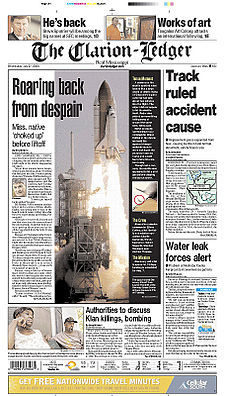- The Clarion-Ledger
-
The Clarion-Ledger 
The July 27, 2005, front page
of The Clarion LedgerType Daily newspaper Format Broadsheet Owner Gannett Company Publisher Larry K. Whitaker Editor Ronnie Agnew Founded 1837 Headquarters 201 S. Congress St.
Jackson, MS 39201
 United States
United StatesCirculation 97,421 Morning
108,738 Sunday[1]Official website clarionledger.com The Clarion-Ledger is the Pulitzer Prize winning daily newspaper of Jackson, Mississippi. It is the second oldest company in the state of Mississippi and is one of only a few newspapers in the nation that continues to circulate statewide. It is an operating division of Gannett River States Publishing Corporation, which is owned by Gannett Company.
Contents
History
The paper traces its roots to The Eastern Clarion, founded in Jasper County, Mississippi, in 1837. Later that year, it was sold and moved to Meridian, Mississippi[1].
After the American Civil War, it was moved to Jackson and merged with The Standard. It soon became known as The Clarion.
Four employees who were displaced by the merger founded their own newspaper, The Jackson Evening Post, in 1882.
In 1888, The Clarion merged with the State Ledger and became known as the Daily Clarion-Ledger.
In 1907, Fred Sullens purchased an interest in the competing The Jackson Evening Post, and shortly after changed the name to the Jackson Daily News. It still remained an evening newspaper.
Thomas and Robert Hederman bought the Daily Clarion-Ledger in 1920 and renamed it The Clarion-Ledger.
On August 24, 1937, The Clarion-Ledger and Jackson Daily News incorporated under a charter issued to Mississippi Publishers Corporation for the purpose of selling joint advertising.
On August 7, 1954, the Jackson Daily News sold out to its rival, The Clarion-Ledger, for $2,250,000 despite a then recent court ruling that blocked The Clarion-Ledger owners from controlling both papers. The Hederman family now owned both papers and consolidated the two newspaper plants[2].
In 1982, Gannett Company purchased the two daily newspapers. Gannett consolidated them into one newspaper by combining the best features of both into The Clarion-Ledger in 1989, bringing the Jackson Daily News to an end. The purchase of both papers by Gannett essentially created a daily newspaper monopoly in Central Mississippi (Gannett also owns the Hattiesburg American in Hattiesburg, Mississippi), which still exists today.
Civil rights
Historically, both newspapers—The Clarion-Ledger and the Jackson Daily News—had a terrible civil-rights record, although third-generation family member Rea S. Hederman made a sincere effort to change that. As an example, when 200,000 people marched on Washington in 1963 to urge "jobs and freedom" for blacks and Martin Luther King, Jr., gave his famous "I Have A Dream" speech, The Clarion-Ledger made short note of the rally but reported the litter-clearance effort the next day under the headline, "Washington is Clean Again with Negro Trash Removed".[3]
Earlier that year, when the Mississippi State University basketball team was scheduled to play the Loyola University Chicago Ramblers, whose starting lineup featured four African-American players, in the NCAA tournament, the Jackson Daily News prominently featured pictures of the four black players in an effort to scare the Bulldogs from playing the Ramblers. The ploy backfired, as the Bulldogs ignored the threat and defied an order from the Governor to face the Ramblers, in an important, but often overlooked, milestone of progress in race relations in sports.
The paper campaigned to preserve segregation and referred to civil rights activists as "communists" and "chimpanzees", prompting some in the African-American community to call the publication, "The Klan-Ledger".[4]
When violence, aided by such rabble rousing, took place in Mississippi, the paper sought to put the blame somewhere else. When Byron De La Beckwith was arrested for killing NAACP leader Medgar Evers, the headline read, "Californian Arrested in Evers Murder", overlooking the fact that Beckwith had lived in Mississippi almost his whole life[4].
The paper's rehabilitation regarding civil rights began in the mid-1970s under Rea Hederman. Hederman expanded the staff and news budget. Editors began to pursue promising young reporters, even from other states. To help gain credibility among blacks, who are 79% of Jackson's population, the paper increased coverage of blacks and increased its black staff.
Ronnie Agnew became the Managing Editor in February 2001. In October 2002, he became the paper's first African-American Executive Editor.
Major awards
In 1983, The Clarion-Ledger won the coveted Pulitzer Prize for a package of stories on Mississippi's education system[3].
References
- ^ The Clarion-Ledger: History of The Clarion-Ledger
- ^ The New York Times: JACKSON NEWS IS SOLD; Passes to Clarion-Ledger After Long Control Battle
- ^ a b "New South at the Clarion-Ledger". Time. May 2, 1983.
- ^ a b From The Clarion-Ledger reporter Jerry Mitchell's Zenger Award Acceptance Speech
External links
- The Clarion-Ledger
- The Clarion-Ledger mobile website
- News Wars: The Rise and Fall of The Clarion-Ledger
Pulitzer Prize for Public Service (1976–2000) Anchorage Daily News (1976) · Lufkin Daily News (1977) · Philadelphia Inquirer (1978) · Point Reyes Light (1979) · Gannett News Service (1980) · Charlotte Observer (1981) · Detroit News (1982) · Jackson Clarion-Ledger (1983) · Los Angeles Times (1984) · Fort Worth Star-Telegram (1985) · Denver Post (1986) · Pittsburgh Press (1987) · Charlotte Observer (1988) · Anchorage Daily News (1989) · Washington Daily News/Philadelphia Inquirer (1990) · Des Moines Register (1991) · Sacramento Bee (1992) · Miami Herald (1993) · Akron Beacon Journal (1994) · Virgin Islands Daily News (1995) · News & Observer (1996) · New Orleans Times-Picayune (1997) · Grand Forks Herald (1998) · Washington Post (1999) · Washington Post (2000)
- Complete list
- (1918–1925)
- (1926–1950)
- (1951–1975)
- (1976–2000)
- (2001–2025)
Categories:- Newspapers published in Mississippi
- Gannett publications
- Media in Jackson, Mississippi
Wikimedia Foundation. 2010.
